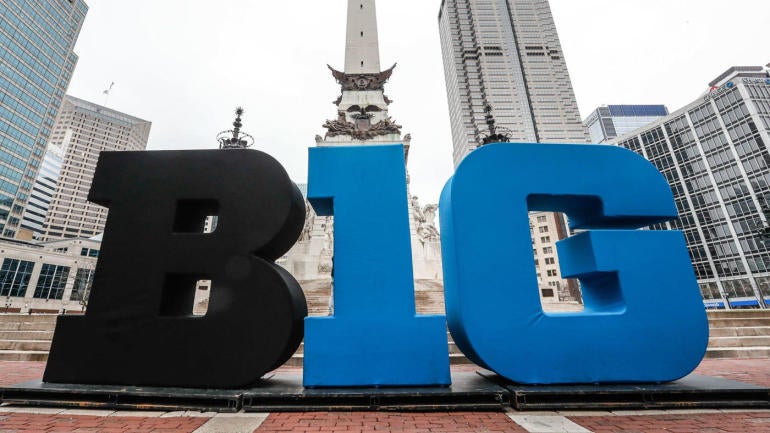
INDIANAPOLIS -- As conference expansion rages onward, Big Ten commissioner Kevin Warren left us breadcrumbs to follow in recent days. Warren's hints at further expansion could result in another bombshell that would shake the Pac-12.
The Big Ten is evaluating the worthiness of adding Cal, Oregon, Stanford and Washington from the Pac-12 to expand its conference to at least 20 teams, sources told CBS Sports this week.
While not confirming expansion activities with those specific schools, Warren told CBS Sports the addition of any teams beyond USC and UCLA (joining in 2024) would come after the current media rights deal is finalized in August.
"We're not 'targeting,'" said Warren when CBS Sports directly inquired about the candidacy of those four programs. "Like I said, my focus is on taking care of our 14 institutions."
However, it's fair to say statements made during Warren's state-of-the-union address at the Big Ten Media Days this week have sent a ripple of concern through college athletics that another bombshell could drop. The Action Network first reported the Big Ten's interest in those programs.
The idea of adding Cal, Oregon, Stanford and Washington would be to establish a Western bulkhead that would be academically appealing enough for Big Ten presidents to approve further expansion. However, it's uncertain whether any of the Big Ten's future rightsholders would find value in such a move.
Financially, those four programs are not worth near the money now expected to be distributed to Big Ten schools with USC and UCLA in the fold ($80 million to $100 million annually). Competitively, though, it would be a lifeline for the Pac-12's next-best football brands.
Oregon has played for championships, Washington claims two titles, and Stanford is considered the next-best Pac-12 football prospect due to excellence established under Jim Harbaugh and David Shaw. Stanford and Cal are also known for their widely successful athletic departments. CBS Sports previously reported Oregon's desperation, and Cal being ditched by UCLA has even drawn the ire of California Gov. Gavin Newsom.
A 20-team Big Ten would be arguably the largest assemblage of football brands major-college sports history. It would also give pause to a collegiate enterprise trying to figure out its future these days.
Warren used some form of the word "bold" eight times on Tuesday. "Aggressive" was used three times in his address. Unlike SEC commissioner Greg Sankey last week, Warren lobbed a veiled warning: The Big Ten may not be done.
"From an expansion standpoint, the answer is … we're not in the market, but we're always looking for what makes sense," Warren told CBS Sports.
"I get asked every single day, 'What's next?'" Warren said during his Big Ten address. "It may include future expansion, but it will be done for the right reasons at the right time with our student-athletes, academic and athletic empowerment at the center of any and all decisions that we will make regarding any further expansions."
Industry sources tell CBS Sports that Cal, Oregon, Stanford and Washington would not bring requisite value as the 16 teams that will make up the league in 2024 with USC and UCLA in the fold. That could lead to the four programs taking substantially less revenue than existing members just to have long-term security in the Big Ten.
The revenue cut taken by Cal, Oregon, Stanford and Washington in joining the Big Ten -- compared to other conference members -- would need to be "significant," industry sources say. That would present a headache to rightsholders trying to restructure a deal already in place.
However, the revenue those four teams could receive would still likely be far higher than the combined value of the 10 remaining Pac-12 schools together. That number is estimated as $21 million to $30 million per school annually.
Still, rightsholders who land portions of the lucrative Big Ten deal (still being negotiated) would be forced to outlay additional funds for those schools. The Big Ten's contract is already projected to be north of $1 billion annually.
The inclusion of those four programs would trigger "dilution," an industry term referring to the proportion of attractive games being lessened by the addition of substandard inventory.
The move could also collapse the Pac-12, which is desperately trying to stay together with its 10 existing members. Then the question becomes: Would further Big Ten expansion force the SEC to make a corresponding move? That after Sankey indicated last week his conference was standing down in expansion for the moment.
"I do believe that Greg and I have a heightened responsibility to make sure we're prudent in our steps," Warren told CBS Sports. "I always ask myself, 'Will this decision make sense 50 years from now?'"
There is the responsibility of basically upsetting the top end of college athletics. With those four schools, the Big Ten would have more than 30% of the current 65 Power Five teams.
And that's not including a possible addition of Notre Dame if it decides to give up its independence. Stanford joining the Big Ten would make the league even more attractive to the Fighting Irish, a source previously told CBS Sports.
"I'm embracing change," Warren said. "I'm going to be very aggressive. I've been that way my entire career."
College athletics sources reached out to CBS Sports concerned with the tenor of Warren's address Wednesday. They believed, even if Warren was going to be aggressive in further expansion, keeping it to himself instead of sending ripples of worry through college athletics might have been a sounder move.
"We will not expand just to expand," Warrens said. "It will be strategic; it will add additional value to our conference."
Asked for his requirements in pursuing new members, Warren went down his checklist.
"Goodness of fit. That's more the holistic viewpoint," Warren told CBS Sports. "Under that, it's the academic stability. Two, the athletic strength. Three, their alumni base. Four, their fan base. Five, the progressive nature of their leadership. That's what made USC and UCLA so special."
Cal, Oregon, Stanford and Washington are all members of the prestigious American Association of Universities (AAU), a grouping of top research institutions. In the current Big Ten, only Nebraska is not a member.
The money issue and upheaval caused by more expansion led one high-profile observer to ask: Would it make more sense for those four to stay out West in a reconstituted Pac-12 than travel athletes across the country in a new league where they would possibly be less competitive?
The Big Ten may be about to answer that question that is more about athletics. What moral obligation would the league have in reorganizing the top end of college athletics? Academically, the four schools fit the Big Ten, but at what cost to the remainder of the Power Five?
"We are dealing with today is because the business of college athletics has grown faster than the structure and the governance of college athletics," Warren said.
Such a move would strip the Pac-12 of half its members. Sources indicate the Pac-12 would most likely have to reform to stay afloat with invitations to the likes of San Diego State and Fresno State. One label put on that grouping was "Mountain West Plus."
The Pac-12 could be in danger on two fronts. The Big 12 is also zeroing on westward expansion with Arizona, at least, according to sources. There is no indication if Arizona State would follow, though CBS Sports previously reported that ASU, Colorado and Utah were the Big 12's targets. San Diego State is in play for both the Pac-12 and Big 12, sources indicate.
Further expansion would be the latest in a series of dauntless moves Warren has taken since assuming the office on Jan. 1, 2020.
Two months into the job, Warren upset his peers by cancelling the season due to COVID-19 concerns. He later relented, but the late start to the season almost cost Ohio State a College Football Playoff spot. The Buckeyes had not played the requisite number of games to qualify for the Big Ten Championship Game that year. Players' parents protested in front of the Big Ten office that year asking that the season be started.
Sportico reported Tuesday the Big Ten athletic directors considered taking a no-confidence vote on Warren in 2020.
"He inherited a nightmare," said Barry Alvarez, former Wisconsin coach and athletic director who now serves as a Big Ten senior football advisor. "You come in during a pandemic. There's no book. 'How do I handle this?' Every meeting is on Zoom. I think Kevin's first face-to-face meeting was this last May with coaches and ADs. I really think he's grown with the league."





















